Did you know that more elite athletes are going vegan?
This includes F1 champion Lewis Hamilton and tennis star Venus Williams.
I’ve seen firsthand how plant-based nutrition can transform athletic performance!
This guide will show you how to fuel your workouts and recovery with tasty, vegan meals for athletes. You’ll discover the best vegan athlete meal plan for 2025 that fuels performance.
They are nutrient-rich.
Are you a weekend warrior or a competitive athlete?
These meal strategies will help you excel while staying plant-based.
Essential Nutrients for Vegan Athletes Meal Plan
I’ve spent years helping vegan athletes with their nutrition. So, I want to share the essential nutrients you need to crush your training.
Trust me, once you understand these basics, you’ll see how easy it is to thrive on a plant-based diet!
Let’s start with protein – the nutrient everyone seems worried about!
I always tell my clients that getting enough protein is doable with plants. I’m a huge fan of combining tempeh, lentils, and quinoa in my meals.
For example, I love making a power bowl with marinated tempeh (20g protein per cup!), black lentils (18g protein per cup), and quinoa (8g protein per cup).
Pro tip: I always keep some roasted chickpeas for easy snacking. They’re perfect for hitting my protein goals between meals.
When it comes to carbs, I’ve learned timing is everything.
Before my long training sessions, I eat easy-to-digest carbs. I have oatmeal with banana and maple syrup.
Here’s a secret I’ve discovered: sweet potatoes are absolute gold for sustained energy. I’ll batch-cook them on Sundays for the week ahead.
Now, let’s talk about those crucial micronutrients that people often miss.
I track my B12 intake and take a supplement. We can’t get enough from plants alone.
For iron, I pair my leafy greens with vitamin C-rich foods. My go-to combo is kale salad with bell peppers and a squeeze of lemon. It’s a game-changer for absorption!
Zinc and omega-3s need special attention, too.
I sprinkle pumpkin seeds on nearly everything for zinc (they’re like little nutrient bombs!).
For omega-3s, a mix of ground flax seeds, chia seeds, and walnuts works wonders. I add them to my morning smoothie and an algae oil supplement for that extra DHA boost.
One thing I’ve learned the hard way?
Don’t skimp on supplements.
Most vegan athletes need good B12, vitamin D, and algae-based omega-3s. This is especially true if they train indoors. I take them with breakfast first thing in the morning to never forget.
This might seem like a lot to track, but I promise it will become second nature. Start with one thing. Focus on protein combos this week. Then, build from there. Your future athletic self will thank you!
Want to know the best part?
Once you nail these nutrients, you’ll likely see better recovery, stable energy during training, and some PRs!
I’ve seen it countless times with athletes I work with. It’s incredible what optimized plant-based nutrition can do.
Do you need more specific advice about any of these nutrients?
Ask me—I’m always excited to help fellow plant-based athletes thrive!
Pre-Workout Vegan Athlete Meal Plan Ideas
Let me share my favourite pre-workout meal strategies for your vegan athlete meal plan.
After years of trial and error and some epic workout fails, I’ve learned what works best for plant-based athletes.
Timing is everything, folks!
I’ve learned that eating 2-3 hours before a big training session is my sweet spot. But here’s the thing: everyone’s different. You’ll need to experiment to find what works for your body. I remember the time I ate a massive bowl of chickpea pasta 30 minutes before a HIIT session… let’s say it wasn’t my finest hour! 😅
Here are my absolute favourite pre-workout meals that have never let me down:
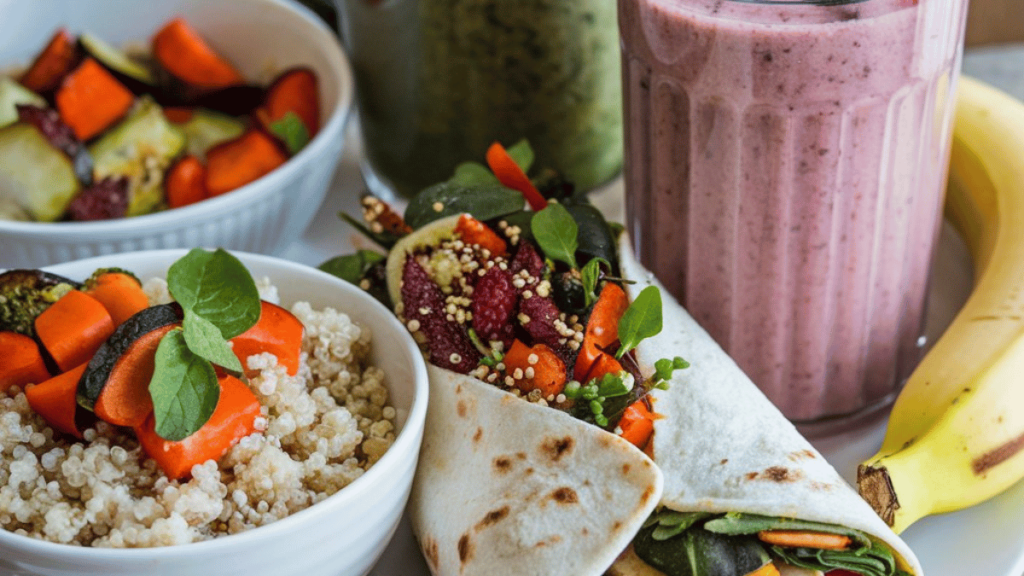
For Morning Training: I’m obsessed with my “Power-Up Oatmeal” combo! I mix rolled oats with plant milk and add a sliced banana, a spoonful of almond butter, and maple syrup. It’s like rocket fuel for those early morning sessions! If I’m short on time, I’ll grab a rice cake with banana and almond butter – simple but effective.
For afternoon workouts, I use my “Energizer Bowl”: quinoa, roasted sweet potato, black beans, and a light tahini dressing. I eat this 2-3 hours before training. It keeps me strong during tough workouts. Combining complex carbs and easy-to-digest protein is just a chef’s kiss.
My Favorite Pre-Workout Smoothie Recipe: This smoothie is a game-changer! I call it my “Green Machine”:
- 1 banana (frozen makes it creamier!)
- Handful of spinach (trust me, you won’t taste it)
- 1 date for natural sugar
- 1 cup plant milk
- 1 tablespoon chia seeds
- Small piece of ginger (great for digestion!)
Quick Snack Options (When You’re in a Rush): I always keep these on hand for those days when time isn’t on my side:
- Apple slices with a little bit of almond butter
- My homemade energy balls (dates, oats, and nuts blended)
- Half a bagel with banana slices
- A handful of dried fruit and a few nuts
Pro Tips I’ve Learned the Hard Way: Listen, I’ve made all the mistakes, so you don’t have to!
Here’s what I’ve learned:
- Keep fibre moderate right before workouts (my stomach thanks me for this one)
- Stay hydrated! I start drinking water at least 2 hours before training
- Avoid trying new foods before a big workout (learn from my mistakes!)
The Portion Control Secret: I used to eat huge portions before working out because I was scared of running out of energy. That was a big mistake! Now, I follow the “palm method” – a portion of carbs about the size of my palm and a smaller portion of protein. It works like a charm!
Here’s a funny story: I once craved cauliflower pizza for a long run. I know precisely how many bathroom stops are along my running route! 😂 The lesson? Keep pre-workout meals simple and familiar.
Remember, these strategies work for me, but everyone’s different! Start with these ideas and adjust based on how your body responds. And hey, if you discover a fantastic pre-workout meal combination, I’d love to hear about it!
What’s your biggest challenge with pre-workout nutrition? We can figure out a plant-based solution that works for you!
Post-workout Recovery Meals
Let’s talk about my favourite post-workout recovery meals!
After crushing a challenging workout, what you eat can make or break your recovery. I’ve spent years perfecting my post-workout nutrition. I’m excited to share what works!
First, let me tell you about my “30-minute window” rule. I always try to get some nutrition within half an hour after training – it’s like magic for muscle recovery! I keep a shaker bottle with protein powder in my gym bag. Let’s be honest: life gets busy, and we need a quick option.
My Go-To Recovery Meals: What’s become my absolute favourite post-workout Meal? My “Recovery Power Bowl!”
Here’s what I throw together:
- Quinoa base (I always batch cook this on Sundays)
- Tempeh chunks (marinated in tamari and maple syrup)
- Black beans
- Roasted sweet potatoes
- Steamed broccoli
- Topped with hemp seeds and a tahini-lemon dressing
I’m telling you, this bowl is packed with everything your muscles need! The quinoa and sweet potatoes restore glycogen, and the tempeh and beans provide protein for muscle repair. Plus, it’s delicious!
Quick Recovery Options: I sometimes run from the gym to meetings. So, I’ve got some quick options that never fail:
- My “Green Goddess” smoothie: plant protein, frozen banana, spinach, pineapple, and coconut water
- Sprouted grain toast with smashed chickpeas and avocado
- Rice cakes that I top with nut butter and sliced banana
Anti-Inflammatory Ingredients I Swear By: I learned this the hard way – inflammation is no joke!
Here are my favourite ingredients that I always include in my post-workout meals:
- Turmeric (I add a pinch to my smoothies with black pepper for absorption)
- Tart cherries (absolute game-changer for muscle soreness!)
- Ginger (fresh or powder, both work great)
- Berries (I keep frozen ones on hand always)
Meal Prep Secrets: Can I share my biggest time-saving hack?
Every Sunday, I prep:
- A big batch of quinoa or brown rice
- Roasted sweet potatoes and other veggies
- Marinated tempeh or tofu
- A big batch of lentils
- My favourite sauces and dressings
This way, I can throw together a recovery meal in minutes! Trust me, when you’re hungry after a workout, you’ll thank yourself for doing this prep.
Pro Recovery Tips I’ve Learned:
Here’s what I’ve discovered through trial and error:
- Hydration is crucial! I keep a massive water bottle with electrolytes ready to go
- Don’t skimp on carbs post-workout – they’re your friends for recovery!
- Include high-water foods, like cucumber and watermelon, to rehydrate.
- Always have a backup plan (I keep emergency protein bars in my car)
The Protein Myth: You know what makes me laugh? I laugh when people ask how I get enough protein as a vegan athlete. My post-workout meals usually have 25-30g of protein. With legumes, grains, and plant-based protein powders, it’s easy to do.
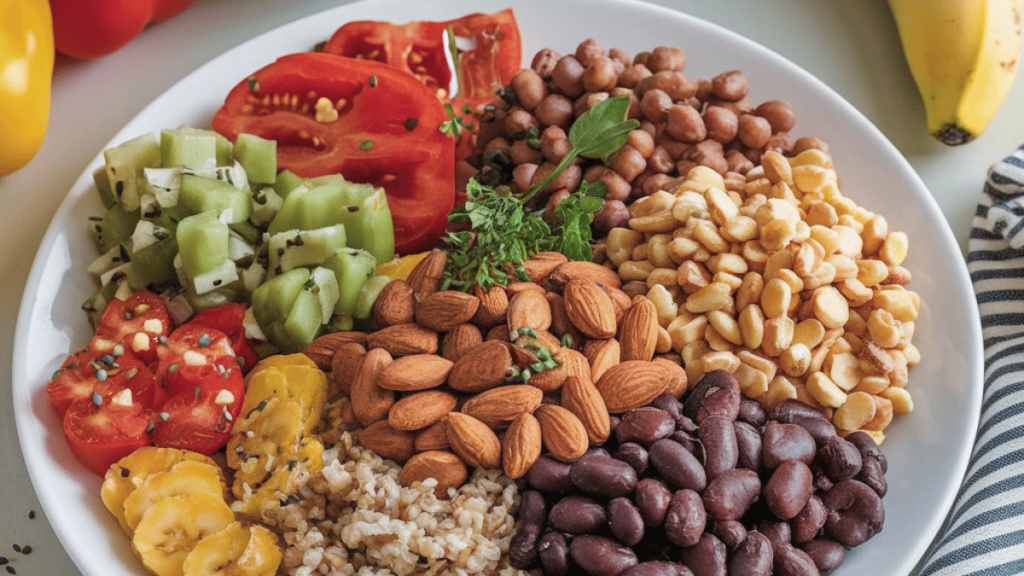
A Word About Portions: I used to undereat after workouts, thinking it would help with “gains.” Big mistake! Now, I ensure my recovery meals are substantial. They are usually 500-700 calories, depending on the workout’s intensity. Your body needs this fuel to repair and rebuild!
Remember this: recovery nutrition doesn’t have to be complicated! Start with one solid meal option and build from there. I’d love to hear what works for you. Have you found any tremendous post-workout meals that keep you strong?
Do you have questions about tweaking these meals for your specific training needs? Please drop them below. I’m always excited to help fellow plant-based athletes optimize their recovery nutrition!
Sample Day Meal Vegan Athlete Meal Plans by Sport
I’ve developed personalized meal plans for different types of athletes.
Let me share them!
After working with everyone from ultrarunners to powerlifters, I’ve learned that each sport has unique fueling needs.
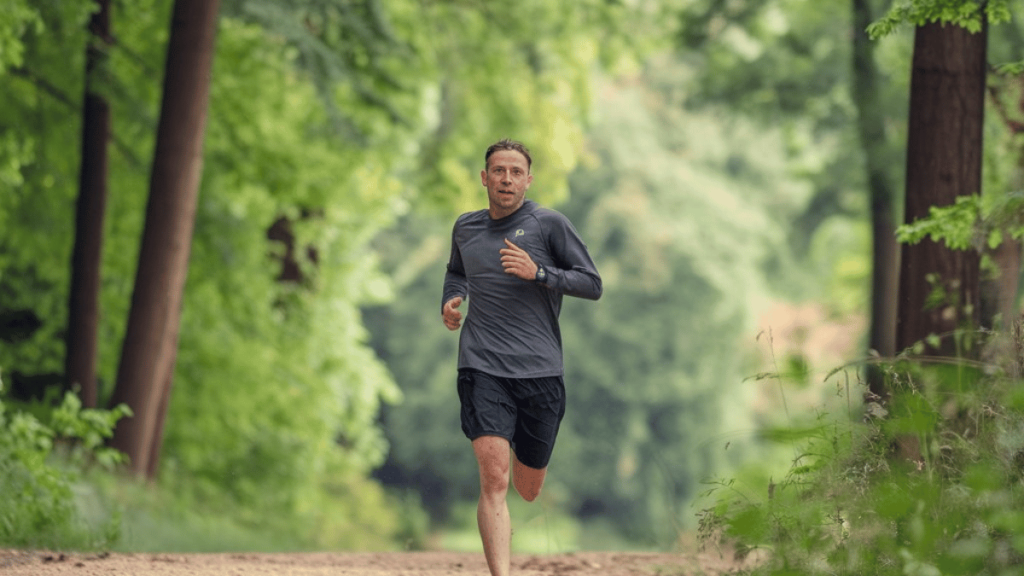
Endurance Athletes (Runners, Cyclists, Triathletes): My favourite fueling strategy for long training days! When I work with endurance athletes, here’s what a typical day looks like:
Pre-Morning Training:
- A light snack: banana with dates (quick energy!)
- 16 oz water with electrolytes (I swear by this!)
Post-Training Breakfast (my favourite part!):
- Giant smoothie bowl with frozen berries, banana, plant protein, and ALL the toppings
- Sprouted grain toast with avocado
- Coffee (because… obviously! 😄)
Lunch:
- Massive Buddha bowl with quinoa, lentils, roasted veggies
- Side of hummus and carrots
- Coconut water for electrolytes
Dinner:
- Sweet potato and black bean enchiladas (total game-changer for glycogen replenishment!)
- Steamed greens with tahini dressing
- Brown rice
Strength Athletes (Weightlifting, CrossFit): You should see how much my powerlifting clients eat! Here’s what works:
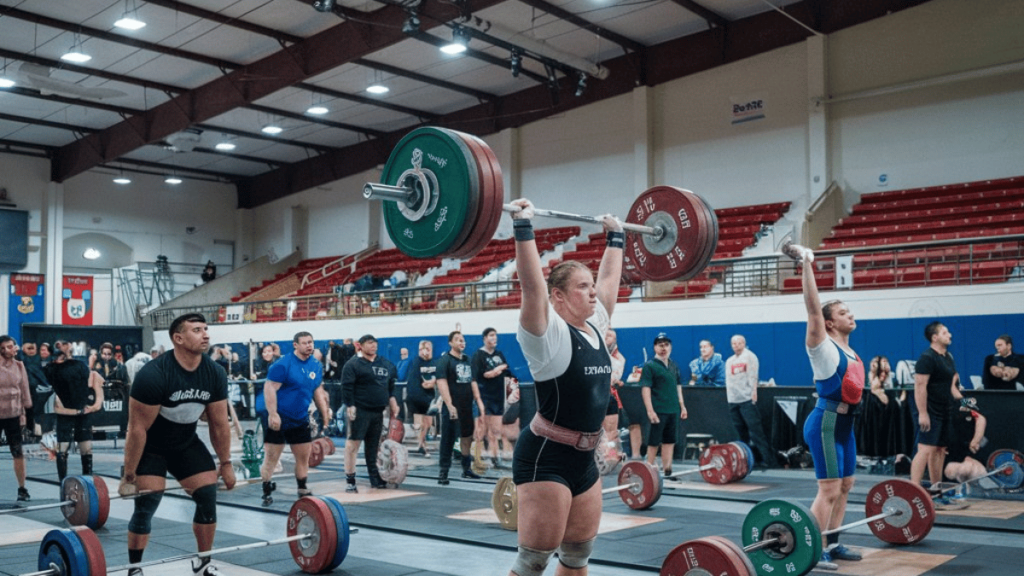
Breakfast:
- Tofu scrambles with nutritional yeast (protein bomb!)
- Oatmeal with protein powder, nut butter, and banana
- Green tea
Pre-Workout Snack:
- Rice cakes with almond butter and maple syrup
- Handful of dates (instant energy boost!)
Post-Workout:
- My famous protein smoothie (frozen banana, berries, plant protein, creatine, peanut butter)
- Bagel with tofu cream cheese
Dinner:
- Tempeh and seitan stir-fry (I pack this with veggies!)
- Brown rice or quinoa
- Roasted broccoli with garlic
Team Sport Athletes (Soccer, Basketball): These athletes need quick energy and sustained fuel! Here’s my go-to plan:
Breakfast:
- Overnight oats with protein powder and fruit
- Toast with nut butter and banana
- Coffee (always coffee!)
Pre-Game Meal (3-4 hours before):
- Pasta with lentil marinara sauce
- Light salad
- A small portion of roasted potatoes
Post-Game:
- Recovery smoothie with plant protein and tart cherry juice
- Rice and bean burrito (easy to pack and eat on the go!)
Combat Sport Athletes: Weight management is crucial here! I’ve developed this lighter but nutrient-dense plan:
Early Morning:
- Green juice with added protein
- Small portion of oatmeal with berries
Pre-Training:
- Apple with almond butter
- Rice cake with banana
Post-Training:
- Protein smoothie bowl
- Ezekiel bread with hummus
Dinner:
- Cauliflower rice stir-fry with tofu
- Steamed vegetables
- Miso soup
Pro Tips I’ve Learned:
- Timing is everything! I always remind my athletes that when you eat is just as important as what you eat
- Keep snacks ready – I prep energy balls every Sunday for the week
- Listen to your body – some days you need more fuel than others
My Favorite Pre-Competition Tip: Never try new foods before a big event! I learned this the hard way during my first marathon – it wasn’t pretty! 😅
Hydration Strategy: I can’t stress this enough. I keep a giant water bottle with me all day. I add electrolytes to at least one bottle. For my endurance athletes, we calculate sweat rate and plan hydration accordingly.
Remember, these are starting points! I always customize based on individual needs, training intensity, and goals. What’s your sport, and how do you currently fuel your training? I’d love to help you optimize your meal plan! 💪
Let’s look at batch cooking for your vegan meals.
Batch Cooking for Athletic Success
I will share my ultimate batch cooking secrets. They have saved me and many athletes. I work with time and stress! After years of juggling training and meal prep, I’ve got this down to a science.
Sunday Meal Prep Magic: You know what’s funny? I used to spend my entire Sunday cooking, but now I’ve got it down to just 2-3 hours! Here’s my foolproof system:
My Essential Prep List:
Protein powerhouses:
- Marinated tempeh (my favorite is maple-garlic!)
- A big batch of lentils
- Baked tofu chunks
- Seasoned chickpeas (I make extra for snacking)
Complex carbs (total game-changers):
- Brown rice or quinoa (I make LOTS)
- Sweet potatoes (I slice and roast them)
- Baked potatoes
- Overnight oats in jars
Veggies galore:
- Roasted vegetable medley
- Chopped raw veggies for snacking
- Massaged kale (stays fresh all week!)
- Steamed broccoli and cauliflower
Time-Saving Hacks I Swear By: Listen, I’ve learned some tricks that save SO much time:
- I use two ovens at different temperatures (if you have ‘them!)
- While the oven’s going, I’ve got grains cooking on the stove
- I prep all veggies first, then move to proteins
- Music is essential – I’ve got my “Meal Prep Mix” that keeps me moving! 🎵
Storage Solutions That Work: Let me tell you about my container system – it’s a game-changer! I use:
- Glass containers for hot foods
- Mason jars for overnight oats and chia puddings
- Silicone bags for chopped veggies
- Old sauce jars for homemade dressings
Pro tip: I label EVERYTHING with dates. Trust me, you don’t want to play the “When did I make this?” game! 😅
My Budget-Friendly Vegan Athlete Meal Shopping Strategy
Here’s how I keep costs down while fueling like a champ:
- I buy beans and grains in bulk (major savings!)
- Frozen fruits and veggies are my friends
- I check for sales on tofu and tempeh (and stock up!)
- Seasonal produce always tastes better and costs less
Quick Assembly Ideas: Here’s what a typical prep day looks like for me:
- First hour: Get all grains and proteins cooking
- Second hour: Prep and roast veggies
- Final hour: Make sauces and portion everything out
My Favorite Time-Saving Equipment:
- Rice cooker (absolute lifesaver!)
- Food processor for chopping
- Multiple baking sheets
- Good quality containers
Storage Duration Tips: I’ve learned exactly how long things last:
- Cooked grains: 4-5 days
- Roasted veggies: 4 days
- Prepped proteins: 3-4 days
- Sauces and dressings: 5-7 days
Emergency Backup Plan: Sometimes life gets wild, so I always keep:
- Frozen portions of cooked grains
- Pre-portioned smoothie bags in the freezer
- Quick-cook legumes
- Emergency protein bars
Real Talk About Meal Prep: Can I be honest? Some weeks, I don’t get it all done – and that’s okay! I’ve learned to prioritize the most critical items first. They are usually proteins and complex carbs. The rest can be more flexible.
Recipe-Free Cooking Method:
My secret for variety?
I make essential ingredients to mix and match all week.
- Different sauces change everything.
- Various spice blends keep things interesting.
- Mix and match proteins with different grains
- Switch up how I cut veggies (sounds simple but works!)
The “Must-Make” Items: If I’m super short on time, these are my non-negotiables:
- At least one protein source
- A big batch of grains
- Roasted veggies
- One sauce or dressing
The best part? Once you get into a rhythm, this becomes second nature! Start small—maybe prep one or two items this week—and build from there.
Got any meal prep challenges you’re struggling with? I’ve faced (and solved) them too! What’s your biggest meal prep obstacle?
Let’s figure out a solution together! 🥗💪
Common Challenges and Solutions
Let me discuss the challenges I’ve faced on the vegan athlete journey. I’ve also helped other athletes overcome them. Trust me, I’ve heard it all and have solutions that work!
Meeting Those Protein Requirements: Listen, I get it – this was my biggest worry when I first started! Here’s the deal: I aim for 1.6-2.0g protein per kg of body weight daily, and yes, it’s doable! Here’s my protein-packing strategy:
- I start my day with a protein-rich breakfast (my tofu scramble is legendary!)
- I add protein powder to my post-workout smoothies
- I always keep high-protein snacks handy (like my homemade tempeh jerky)
- Every Meal has at least one protein source
Pro tip: I track my protein intake for a few days every month to ensure I’m hitting my goals. There is no need to track forever—just long enough to develop good habits!
Energy Level Struggles: Oh boy, do I remember the energy crashes I used to have! Here’s how I fixed them:
Iron Levels: You know what was my game-changer? Regular iron testing! I now:
- Combine iron-rich foods with vitamin C
- Cook in cast iron pans (seriously, it works!)
- Take my iron supplements with citrus juice
- Avoid coffee/tea near iron-rich meals
Eating Enough Calories: This is huge! I used to under-eat without realizing it. Now I:
- Track my calories occasionally to ensure I’m eating enough
- Add calorie-dense foods like nuts and avocados
- Drink smoothies when I’m not hungry but need fuel
- Keep easy-to-eat snacks in my gym bag
The Hunger Games: Sometimes I feel like I could eat everything in sight! Here’s how I deal:
- I prep protein-rich snacks
- Always have a post-workout meal ready
- Keep fruit and nuts everywhere (car, gym bag, office)
- Plan my most significant meals around training times
Travel and Competition Nutrition: This used to stress me out so much! Now I have a system:
My Travel Toolkit:
- Protein powder in pre-measured bags
- Quick-cook oatmeal packets
- Trail mix and energy bars
- Electrolyte packets
Hotel Room Hacks:
- I bring a mini blender (total game-changer!)
- Book rooms with mini-fridges
- Scout local grocery stores beforehand
- Pack a camping spork (sounds weird, but so helpful!)
Competition Day Strategy: Here’s what works for me:
- Stick to familiar foods
- Pack more snacks than I think I’ll need
- Bring backup options for everything
- Stay hydrated (I set phone reminders!)
Restaurant Navigation: I’ve gotten good at this! My strategy:
- Check menus ahead of time
- Call restaurants with questions
- Know how to modify standard dishes
- Always carry emergency snacks
The Social Aspect: Let’s talk about the elephant in the room – social situations! Here’s how I handle them:
- I’m upfront about my dietary needs
- I offer to bring dishes to share
- I eat before social events if needed
- I focus on the company, not the food
Recovery Challenges: A plant-based diet can slow recovery if you’re not careful.
My solutions:
Inflammation Management:
- I include turmeric and ginger daily
- Focus on whole foods
- Get enough omega-3s (algae supplements are key!)
- Stay hydrated (I aim for urine the colour of light lemonade)
Sleep and Recovery:
- I plan carb-rich meals for dinner
- Take magnesium before bed
- Use tart cherry juice for natural recovery
- Create a solid sleep routine
Here’s my advice: start with one challenge at a time, and don’t try to fix everything simultaneously.
Pick your biggest struggle and focus on that first.
Remember, we expect these challenges, and they’re not permanent!
You can thrive as a plant-based athlete with some planning and the right strategies. What’s your biggest challenge right now? Let’s tackle it together! 💪🌱
Conclusion
Plant-based nutrition can support your athletic goals. We’ve shared your best vegan athlete meal plan for 2025. It’s about planning and knowing your needs.
Use these meal plans and recipes as a base. Experiment to find what works best for your body and training schedule.
Ready to take your plant-based athletic journey to the next level?
Implement one new pre-workout Meal this week and build from there. Your future PRs await!
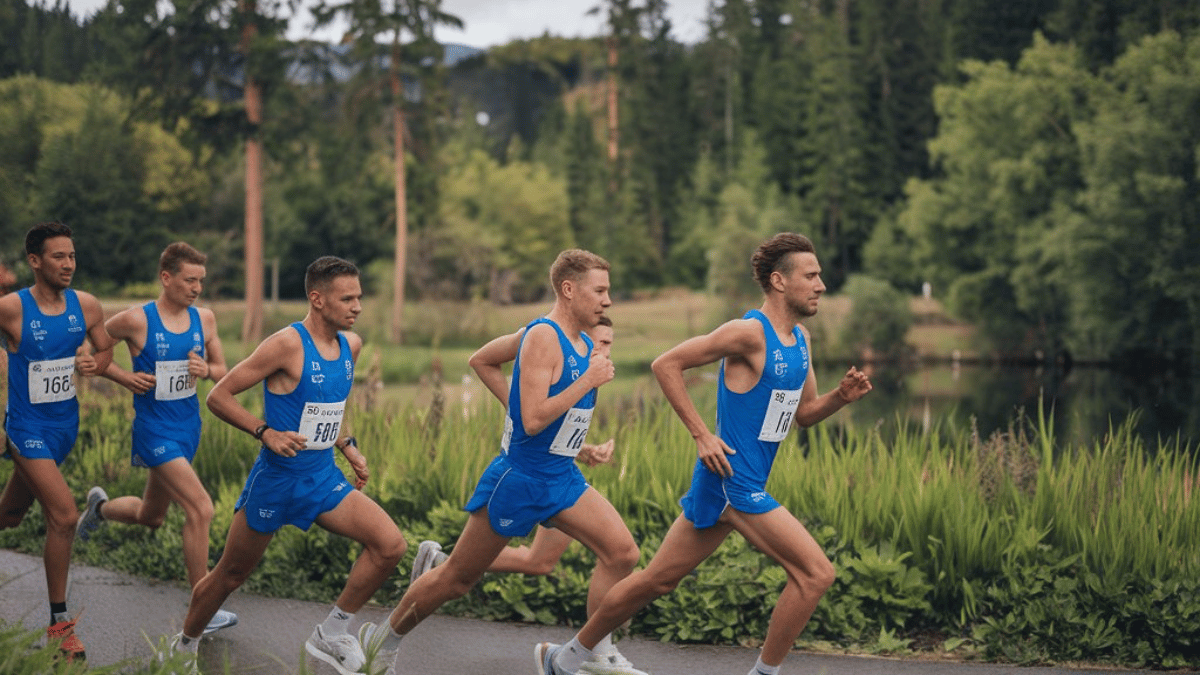
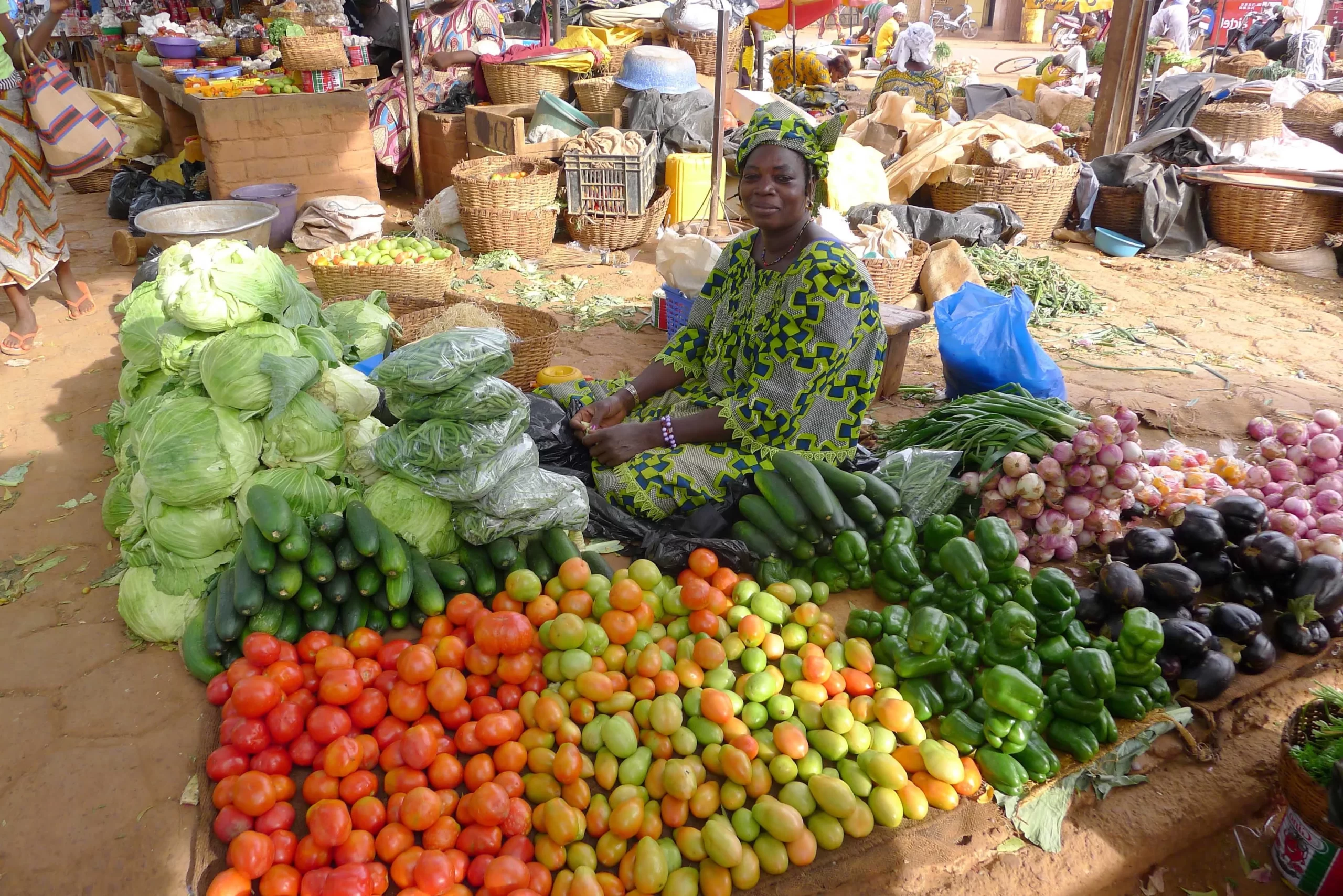
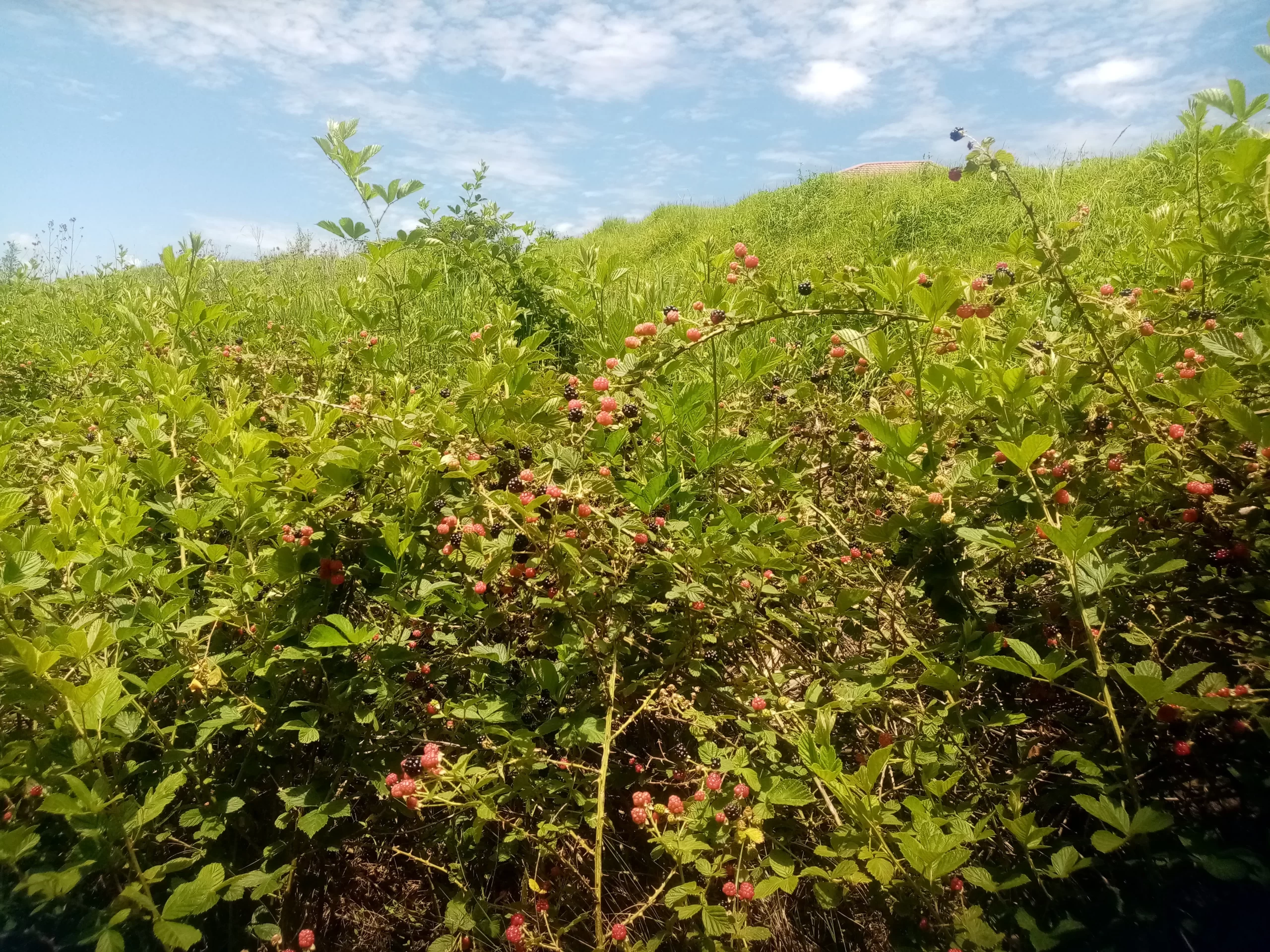
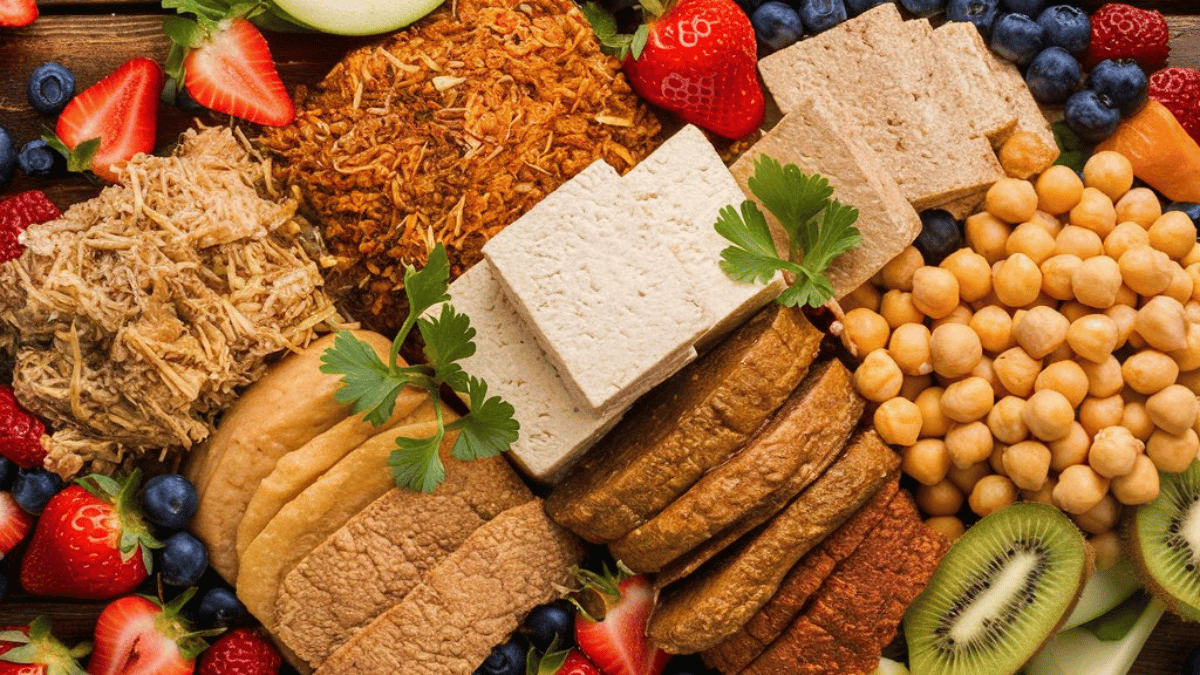
Leave a Reply